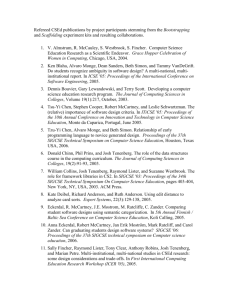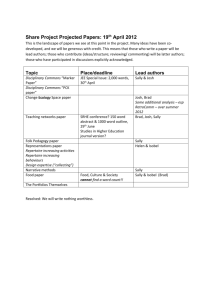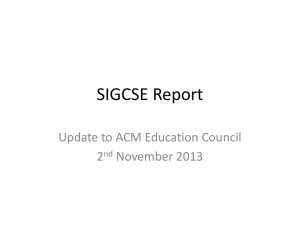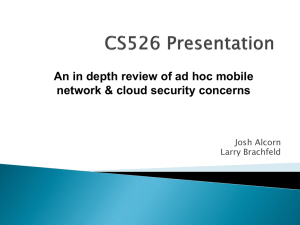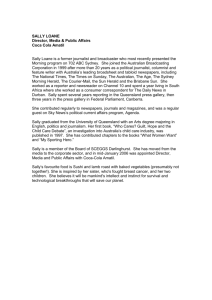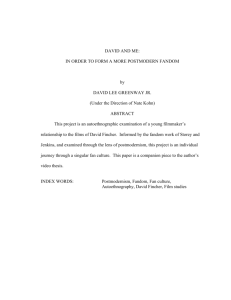References Cited
advertisement
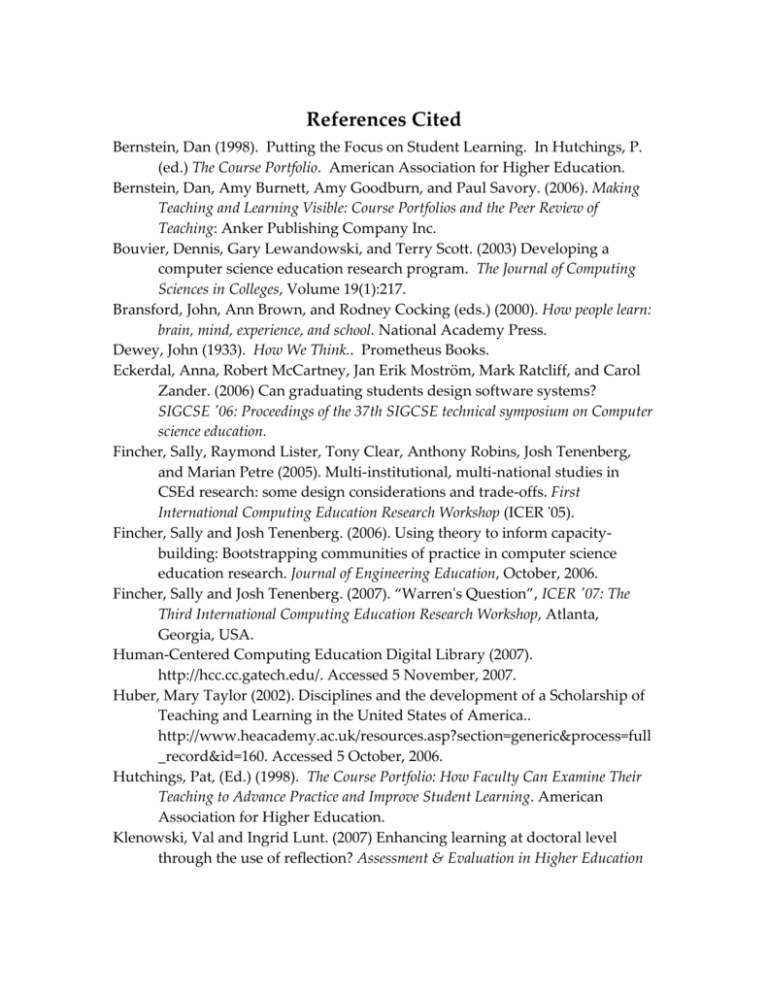
References Cited Bernstein, Dan (1998). Putting the Focus on Student Learning. In Hutchings, P. (ed.) The Course Portfolio. American Association for Higher Education. Bernstein, Dan, Amy Burnett, Amy Goodburn, and Paul Savory. (2006). Making Teaching and Learning Visible: Course Portfolios and the Peer Review of Teaching: Anker Publishing Company Inc. Bouvier, Dennis, Gary Lewandowski, and Terry Scott. (2003) Developing a computer science education research program. The Journal of Computing Sciences in Colleges, Volume 19(1):217. Bransford, John, Ann Brown, and Rodney Cocking (eds.) (2000). How people learn: brain, mind, experience, and school. National Academy Press. Dewey, John (1933). How We Think.. Prometheus Books. Eckerdal, Anna, Robert McCartney, Jan Erik Moström, Mark Ratcliff, and Carol Zander. (2006) Can graduating students design software systems? SIGCSE '06: Proceedings of the 37th SIGCSE technical symposium on Computer science education. Fincher, Sally, Raymond Lister, Tony Clear, Anthony Robins, Josh Tenenberg, and Marian Petre (2005). Multi-institutional, multi-national studies in CSEd research: some design considerations and trade-offs. First International Computing Education Research Workshop (ICER '05). Fincher, Sally and Josh Tenenberg. (2006). Using theory to inform capacitybuilding: Bootstrapping communities of practice in computer science education research. Journal of Engineering Education, October, 2006. Fincher, Sally and Josh Tenenberg. (2007). “Warren's Question”, ICER '07: The Third International Computing Education Research Workshop, Atlanta, Georgia, USA. Human-Centered Computing Education Digital Library (2007). http://hcc.cc.gatech.edu/. Accessed 5 November, 2007. Huber, Mary Taylor (2002). Disciplines and the development of a Scholarship of Teaching and Learning in the United States of America.. http://www.heacademy.ac.uk/resources.asp?section=generic&process=full _record&id=160. Accessed 5 October, 2006. Hutchings, Pat, (Ed.) (1998). The Course Portfolio: How Faculty Can Examine Their Teaching to Advance Practice and Improve Student Learning. American Association for Higher Education. Klenowski, Val and Ingrid Lunt. (2007) Enhancing learning at doctoral level through the use of reflection? Assessment & Evaluation in Higher Education Lewandowski, Gary, Alicia Gutschow, Robert McCartney, Kate Sanders, and Dermot Shinners-Kennedy. (2005). What novice programmers don't know. In ICER ’05: First International Computing Education Research Workshop. Lister, Raymond, Ilona Box, Briana Morrison, Josh Tenenberg and Suzanne Westbrook, (2004). The Dimensions of Variation in the Teaching of Data Structures. 9th Annual Conference on Innovation and Technology in Computer Science Education, Leeds, UK. Mansvelder-Longayroux, Désirée, Douwe Beijaard, and Nico Verloop (2007). The portfolio as a tool for stimulating reflection by student teachers. Teaching and Teacher Education 23:47–62 Orland-Barak, L. (2005) Portfolios as evidence of reflective practice: What remains “untold’’ Educational Research, 47 (1), 25-44. Peer Review of Teaching (2007). www.courseportfolio.org/. Accessed 5 November 2007. Richardson, Virginia (1990). Significant and Worthwhile Change in Teaching Practice. Educational Researcher, 19(7): 10-18. Robinson, Jennifer (2004). Course Portfolios as Scaffolding for Scholarship of Teaching and Learning. Inaugural conference of the International Society of the Scholarship of Teaching and Learning, Bloomington, Indiana. Rodgers, Carol (2002). Defining Reflection: Another Look at John Dewey and Reflective Thinking. Teachers College Record 104(4), 842-866. Sanders, Kate, Sally Fincher, Dennis Bouvier, Gary Lewandowski, Briana Morrison, Laurie Murphy, Marian Petre, Brad Richards, Josh Tenenberg, Lynda Thomas, Richard Anderson, Ruth Anderson, Sue Fitzgerald, Alicia Gutschow, Susan Haller, Raymond Lister, Renee McCauley, John McTaggart, Christine Prasad, Terence Scott, Dermot Shinners-Kennedy, Suzanne Westbrook, and Carol Zander. (2005). A multi-institutional multinational study of programming concepts using card sort data. Expert Systems, 22(3):121-128. Sanders, K. and Thomas, L. (2007). Checklists for grading object-oriented CS1 programs: concepts and misconceptions. In Proceedings of the 12th Annual SIGCSE Conference on innovation and Technology in Computer Science Education, Dundee, Scotland, 166-170. Shulman, Lee (1986). Those who understand: knowledge growth in teaching. Educational Researcher, 15(2):4-14. Shulman, Lee (1993). Teaching as Community Property: Putting an End to Pedagogical Solitude. Change. 25 (6) (Nov/Dec). Schön, Donald (1987). Educating the Reflective Practitioner. Jossey-Bass Publishers. Tenenberg, Josh, Sally Fincher, Ken Blaha, Dennis Bouvier, Tzu-Yi Chen, Donald Chinn, Stephen Cooper, Anna Eckerdal, Hubert Johnson, Robert McCartney, Alvaro Monge, Jan Erik Moström, Marian Petre, Kris Powers, Mark Ratcliffe, Anthony Robins, Dean Sanders, Leslie Schwartzman, Beth Simon, Carol Stoker, Alison Elliott Tew, and Tammy VanDeGrift. (2005). Students designing software: A multi-national, multi-institutional study. Informatics in Education, 4(1):143-162. Tenenberg, Josh and Sally Fincher. (2007). Opening the Door of the Computer Science Classroom:The Disciplinary Commons. SIGCSE '07: Proceedings of the 38th SIGCSE technical symposium on Computer science education. Virginia Tech and Villanova Syllabus Repository (2007). http://doc.cs.vt.edu/syllabus/. Accessed 5 November, 2007.
